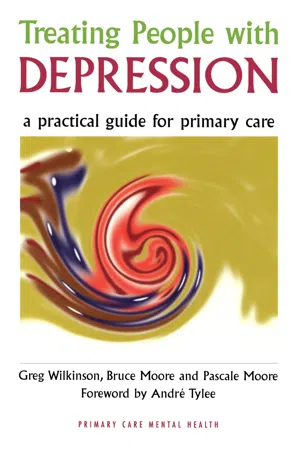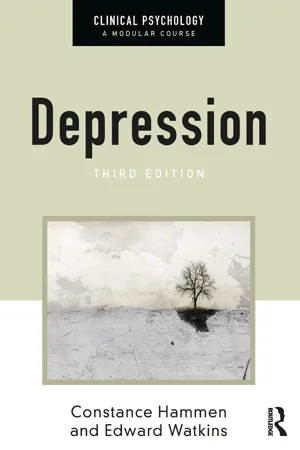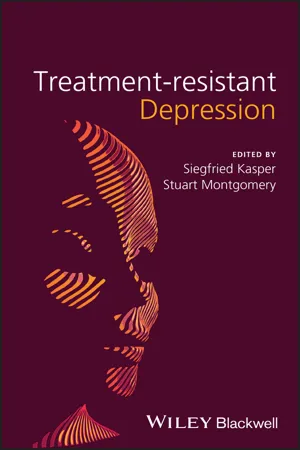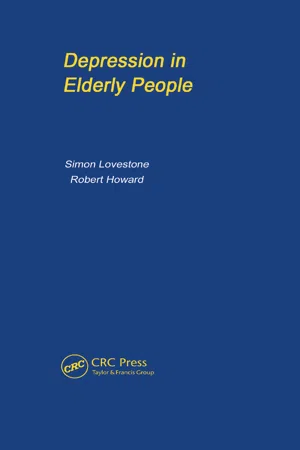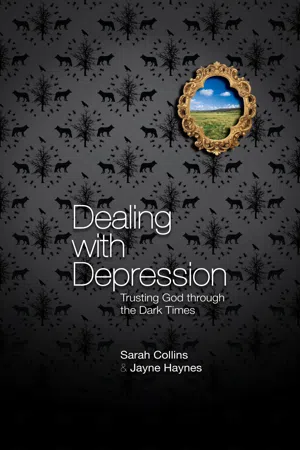Depression Treatment
Depression treatment involves various approaches aimed at alleviating symptoms and improving overall well-being. Common treatments include psychotherapy, medication, and lifestyle changes. Psychotherapy, such as cognitive behavioral therapy, helps individuals address negative thought patterns, while medications like antidepressants can help regulate brain chemistry. Lifestyle changes, including exercise and stress management, also play a crucial role in managing depression.
8 Key excerpts on "Depression Treatment"
- Amy E. Wenzel(Author)
- 2017(Publication Date)
- SAGE Publications, Inc(Publisher)
...Pim Cuijpers Pim Cuijpers Cuijpers, Pim Depressive Disorders: Treatment Depressive Disorders: Treatment 1063 1066 Depressive Disorders: Treatment There are many different types of treatment for depressive disorders. The two most important types are psychotherapy and pharmacotherapy. There are, however, also many other kinds of treatments, such as electroconvulsive therapy (ECT) and light therapy for seasonal affective disorders. In this entry, an overview of these treatments is given as well as the known effects of these therapies. Psychotherapies Psychotherapies (or psychological treatments) are interventions with a primary focus on language-based communication between a patient and a therapist. Types Many forms of psychotherapy have been developed to treat depression. Not all of them have been examined in well-designed randomized controlled trials. The ones that have been examined well and included in most treatment guidelines include cognitive behavioral therapy (CBT), interpersonal psychotherapy, problem-solving therapy, brief psychodynamic therapy, and nondirective supportive counseling. In CBT, it is assumed that patients become depressed because of dysfunctional thoughts about themselves, their environment, and their future. CBT is aimed at evaluating, challenging, and modifying these errors in thoughts. In CBT, the therapist focuses on the current situation of the patient, using a psychoeducational approach with a strong focus on homework. One component of CBT is behavioral activation, which is aimed at increasing positive interactions between the patient and his or her environment. During therapy, the patient learns which activities increase his or her mood and how he or she can undertake these activities more often...
- eBook - ePub
Treating People with Depression
A Practical Guide for Primary Care
- Greg Wilkinson, Bruce Moore, Pascale Moore(Authors)
- 2018(Publication Date)
- CRC Press(Publisher)
...Untreated episodes usually resolve within 3-6 months. However, relapse is frequent, and some 15–20% of people follow a chronic course. For this reason, treatment must aim not only to speed recovery from the current episode but also to maintain improvements and, if possible, to reduce the likelihood of recurrence. It is this concern which has encouraged the development of psychological treatments designed to teach patients active depression-management skills. Due to the specialist nature of the various psychological therapies, referral to a clinical psychologist or specially trained therapist is usually required. However, in mild depression and with relatively motivated and intelligent patients, it may be possible to achieve considerable benefit by outlining the main principles to the patient and helping them develop an alternative way of thinking about their problems. Generally, motivated and informed GPs will be effective in using the guidelines outlined in the final section of this chapter on page 94. Psychotherapeutic approaches There exists a wide range of psychological therapies, including supportive psychotherapy, psychoanalytical, interpersonal, counselling and family therapy; all have utility when used appropriately. For the purpose of this book, only cognitive and cognitive behavioural therapy will be discussed in any detail (see page 88). It is the psychological treatment most widely available and readily practicable, and has well-established efficacy in depression. Supportive psychotherapy This is the most common form of psychotherapy and can be helpful in depression of all degrees of severity. Supportive psychotherapy involves the therapist in listening empathically to the patient’s problems, and in helping them organise their thoughts and feelings, reconsidering the way they see themselves. Therapists do not usually require formal training...
- eBook - ePub
- Constance Hammen, Ed Watkins(Authors)
- 2018(Publication Date)
- Routledge(Publisher)
...8 Psychological treatments There are now many systematically tested and effective psychological treatments for depression, providing optimism for both therapists and patients. RCTs have confirmed that most bona fide psychological treatments for depression, that is, treatments with a good rationale for treating depression, outperform no treatment and waiting list control conditions, indicating that the treatments work, and that they are of similar efficacy to each other and to antidepressant medication (see Chapter 7) (Cuijpers, van Straten, Andersson and van Oppen, 2008; Cuijpers, van Straten, van Oppen and Andersson, 2008). This chapter will review the methods, effectiveness, applications and mechanisms of psychological treatment by focusing on three illustrative, distinct treatments: Behavioural Activation (BA), CBT and Interpersonal Therapy (IPT). In addition, this chapter will consider some key challenges and questions for psychological treatments. One major challenge is that despite being efficacious, psychological treatments still only produce sustained and full recovery in approximately 30–40 per cent of patients with depression, indicating scope for significant improvement. Further, treatment outcomes have not significantly improved for over 40 years since the development of CBT, raising the question of how to improve the effectiveness of therapy. A second related challenge is that we still don’t know exactly how psychological treatments work or what their active ingredients are. A third major challenge is how to make evidence-based treatments accessible and available to as many people with depression as possible given the high prevalence of depression worldwide (see Chapter 2) and the relatively limited number of therapists...
- eBook - ePub
- Siegfried Kasper, Stuart A. Montgomery, Siegfried Kasper, Stuart A. Montgomery(Authors)
- 2013(Publication Date)
- Wiley-Blackwell(Publisher)
...The most fully developed and best studied psychotherapies include Beck’s cognitive therapy (CT) (Beck et al., 1979) and IPT (Klerman et al., 1984), although a broader array of conceptually related interventions referred to as CBT also show merit. These therapies share several common elements: (1) they are time-limited (typically 8–16 weeks in duration); (2) they focus primarily on the here and now, rather than the past; (3) the aim to treat the depressive episode as the primary goal; and (4) they follow a specified procedure and use a set of techniques guided by a particular theory of depression or behaviour change. These interventions are further differentiated from more traditional psychodynamic psychotherapies by the fact that, at the time of their introduction, their utility for treatment of depression was established by RCTs. In this way, advocates of the depression-focused psychotherapies shared the empirical zeitgeist that was being championed by biologically orientated researchers. Although advocates of psychoanalytic psychotherapy once rejected the ability of RCTs to empirically validate the utility of their clinical methods, over the past several decades a literature pertaining to the use of psychodynamic psychotherapy for the treatment of depression has begun to emerge (see, for example, Driessen et al., 2010a). Evidence that psychotherapy is as effective as pharmacotherapy Although psychotherapy is the leading alternative to pharmacotherapy for first-line treatment of MDD, the levels of empirical support for these modalities are not comparable...
- eBook - ePub
- J. Mark G. Williams(Author)
- 2013(Publication Date)
- Routledge(Publisher)
...Chapter 4 Psychological treatment of depression:Outcome studies Although theories about the aetiology, precipitation and maintenance of depression differ from each other, the treatment techniques predicted to be effective by the various models tend to converge. That is not to say that there are only a few methods used. On the contrary, I shall list over twenty techniques which have been applied, usually grouped in some multifaceted procedure, to clinically depressed patients. But each of these techniques could be argued to be affecting a subsystem of several of the psychological models outlined in Chapters Two and Three. In this chapter I should like to overview these procedures and the evidence for their effectiveness. In addition, I wish to discuss three other issues. First, the supposed commonality in procedures and in the factors mediating recovery. Second, the evidence for whether there exist any indications and contra-indications for the use of cognitive-behaviour therapy with depressed patients, or any evidence on which technique to use with which patient. Finally, the relationship of cognitive-behaviour therapy to pharmacotherapy will be discussed. In an early paper Whitehead (1979) outlined four general, though distinct, rationales from which cognitive and behavioural strategies were derived: That the depressive behaviour per se constitutes the disorder and can be modified by suitable manipulation of reinforcers. That depressive behaviour is a result of (or is maintained by) a reduced rate of positive reinforcement and that this reinforcement should be reinstated by a suitable manipulation. That depressed individuals fail to respond because they believe themselves to lack any control over their environment...
- eBook - ePub
- Robert Howard(Author)
- 2020(Publication Date)
- CRC Press(Publisher)
...Psychological treatments for depression Psychotherapy Psychotherapy should not be ignored as a treatment option in the elderly and there is a growing interest in this field. Individual or group psychotherapy is most effective in the treatment of depression in elderly patients if combined with antidepressant therapy. The goals of therapy should be explicit, although therapists should not be too pessimistic about the capacity for change in elderly individuals. Studies have indicated that both the psychodynamic and cognitive-behavioural approaches are equally successful with the elderly, although the mechanisms of the effect of psychotherapy are not understood, and it is probably more important to match a therapist and a patient with a therapeutic model that both find acceptable. Some authors have suggested that the life review approach, in which patients are encouraged to achieve a resolution of the life cycle as a positive experience, may not be effective in the treatment of depressed patients who may see their lives in a very negative light. Cognitive therapy As the only psychological treatment designed specifically for depression and with its directed, focused and time-limited nature, cognitive therapy seems a particularly appropriate method for treating older depressed patients. Studies have investigated the use of cognitive therapy with medically ill patients and shown some improvements in functioning and mental state when the therapy is given by physicians. Cognitive therapy is built upon a model of depression that proposes a cognitive triad that develops in a depressed individual. The individual acquires a negative view of self, their future and the world. They believe, to varying degrees, that they are useless or inadequate, that their future is unrelentingly bleak and hopeless and that the outside world or their experiences are deprived, obstructive or diminished...
- eBook - ePub
Mending a Broken Mind
Healing the Whole Person Who Suffers with Clinical Depression
- Andrew Adam White(Author)
- 2021(Publication Date)
- Cascade Books(Publisher)
...5 Medical Treatment of Depression I am indebted to the authors of Clinical Psychopharmacology: Edition 8 for some of the information in this chapter and Appendix A. I have, however, put the information in my own words. I also include important information from many other sources including some in my Selective Bibliography. There are two main approaches to treating major depression: (1) medical treatment, especially antidepressant medications, and (2) counseling. Treatment of major depression with either one (antidepressants) or the other (counseling) or both together has been shown repeatedly in many rigorous research studies to: 1. shorten current depressive episodes 2. decrease psychosocial impairment 3. decrease risk of suicide 4. increase quality of life 5. decrease relapse rate Many experts believe that mild depression should be treated with psychotherapy alone; if the symptoms worsen, antidepressants can be prescribed. Another approach in mild depression is watchful waiting by monitoring symptoms to see if they resolve spontaneously without any treatment. If watchful waiting is chosen as the management strategy, the depressed person should be educated about symptoms that would necessitate a reevaluation. For moderate depression, antidepressant medications alone or counseling alone are often effective. Many experts, however, recommend using both. I certainly do. Most of these experts also believe that using antidepressants should almost always be part of the treatment plan for moderately severe and severe depression. In the rest of this chapter, we’ll address medical treatments for depression and bipolar disorder including bipolar depression. Detailed information on specific antidepressants is found in Appendix A. If you are on an antidepressant or your healthcare professional is going to prescribe one, you can look it up in this appendix...
- eBook - ePub
Dealing With Depression
Trusting God through the Dark Times
- Sarah Collins and Jayne Haynes(Author)
- 2015(Publication Date)
- Christian Focus Publication(Publisher)
...Also in this category are practical ‘common sense’ strategies that might help – such as getting enough sleep and exercise, eating well, and not drinking too much alcohol. Occasionally secular self-help manuals may promote ideas that Bible-believing Christians may disagree with – most commonly this might be along the lines of ‘whatever makes you happy is good’. Our recommendations for using self-help materials would be to consider using a specifically Christian self-help book [1], or to use a good secular book but to be testing it against Bible truths (this may need the help of a Christian friend supporting the depressed person). T ALKING TREATMENTS This is a cover-all term for the many different ‘psychological therapies’ that are available – the common ones include counselling, cognitive behavioural therapy (CBT) and psychodynamic psychotherapies. The therapy is given by a trained therapist who will often use a combination of techniques, either in a one–to–one setting, or in a group, for a course of sessions. Computerised CBT is also available online. In the UK talking treatments are available from the National Health Service (NHS) (often accessed through a family doctor), charities and private therapists. CBT in particular has been shown in research to be a good treatment for depression. In addition to helping with the current episode of depression talking treatments may help people develop strategies for avoiding another attack in the future. As with self-help there may be times when a secular therapist holds to non-biblical views. However more often than not Christians have lots to gain from talking treatment with a well-trained therapist. We would suggest either using a secular therapist but arranging ‘debriefing’ sessions with a supportive Christian friend to consider the content of the therapy in the light of the Bible, or alternatively using a Christian therapist...

